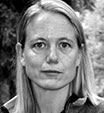The National Endowment for the Humanities has awarded Leila Philip, associate professor of English at Holy Cross, a summer stipend in the amount of $6,000. This is her second award from the NEH; her first was a yearlong Research Fellowship in 2011, which she used to write her award-winning book, “A Family Place, A Hudson Valley Farm, Three Centuries, Five Wars, One Family,” published in 2011 by Viking. She is among 76 recipients selected from more than 900 applicants.
A highly awarded writer of literary nonfiction, Philip will use the stipend to research the late Toshiko Takaezu for a book-length scholarly examination. An internationally recognized ceramic artist, Takaezu’s career and personal life has never been fully recognized in the larger art world. Her work resides in more than 40 museums and has been featured at the National Museum of Contemporary Art in Kyoto.
Philip, who studied with Takaezu when Philip was a student at Princeton, originally began her research in 2007, with the support of a prestigious Guggenheim Fellowship. The NEH funding will allow Philip to return to research and writing on Takaezu.
Takaezu’s story has national resonance. She was born in Pepeekeo, Hawaii in 1922. Her parents were sugarcane laborers who emigrated from Okinawa, Japan. During Takaezu’s lifetime, she experienced the attack on Pearl Harbor firsthand, traveled to Japan to study traditional Japanese arts, lived in a Japanese Buddhist temple, and trained in ceramics at the Cranbrook Academy of Art in Michigan.
Takaezu was influenced in part by the Abstract Expressionist movement of the postwar American art scene. Her signature pieces were closed form pots, which had no utilitarian function. These art objects were created solely for the purpose of artistic inquiry and aesthetic appreciation and were glazed with bold calligraphic brush strokes.
“In part, she’s a very significant postwar American artist whose contributions have not yet been fully positioned or understood,” Philip says. “She’s been recognized within the craft world, but hasn’t yet been recognized as part of the larger postwar American art scene. So it’s exciting to tell a story that hasn’t been told yet and to bring her into the larger conversation about Asian-American art which is now being reconsidered with new discourse on transnationalism. I am really grateful for the chance to get back to work on this project."
Philip, who is fluent in Japanese, holds a fifth-year degree in East Asian Studies from Princeton and earned her master of fine arts degree in fiction at the Columbia University, where she was a writing fellow from 1989-2001. At Holy Cross, she has been actively involved in developing the Creative Writing program and has taught courses in fiction, creative nonfiction, and Asian-American literature. Most recently she and religious studies professor Todd Lewis co-taught a course in creative writing and religion titled Land, Spirit, Pilgrimage.
Philip’s research will help her write her fourth, or perhaps fifth, book. She has another book titled “Water Rising” which is finished and awaiting publication. The book is a collaborative project of text and image which counterparts 11 watercolors by artist Garth Evans, with 11 pieces of Philip’s writing
The National Endowment for the Humanities is an independent federal agency created in 1965 and is one of the largest funders of humanities programs in the United States. 
English Professor Receives NEH Summer Stipend to Study Postwar Asian-American Artist
Read Time
2 Minutes